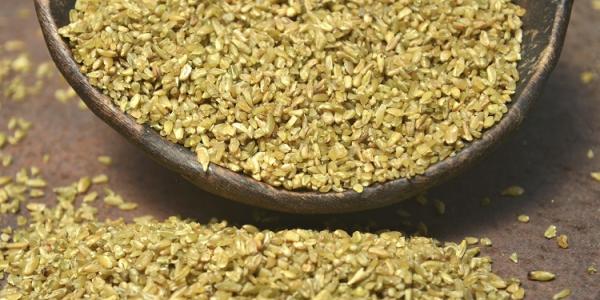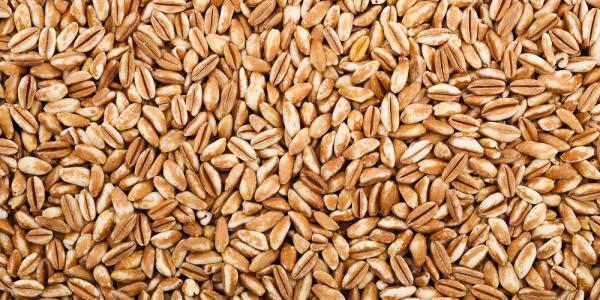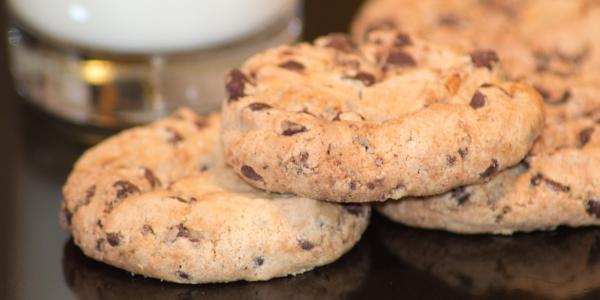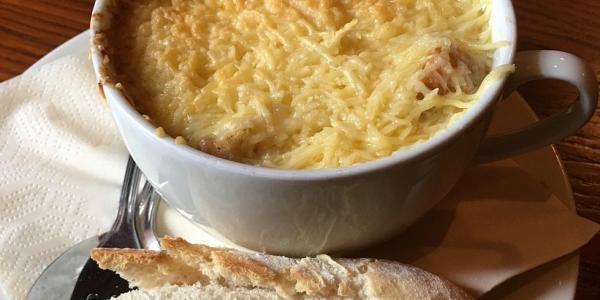Freekeh Chili

Ingredients
- 3 T. canola oil
- 1 ½ c. diced onion
- 1 c. diced celery
- 1 red pepper, diced
- 1 jalapeño chile pepper, seeded and diced
- 3 cloves of garlic, minced
- 2 T. tomato paste
- 1-12 oz. bottle of your favorite beer
- 4 c. vegetable broth
- 1-28 oz. can diced tomatoes
- 2-14 oz. cans black beans, rinsed and drained
- 2 c. cracked freekeh
- 4 T. chili powder
- 1 ½ T. ground cumin
- 2 t. dried oregano
- 2 t. paprika
- 1 t. smoked paprika
- ½ t. cayenne pepper
- 2 t. apple cider vinegar
- ¼ c. chopped fresh cilantro
- Salt, to taste
- Pepper, to taste
Preparation
Warm the oil in a large pot over medium heat. Sauté onions, celery, and peppers over medium heat for 5 minutes. Add garlic and tomato paste and sauté an additional 2 minutes.
Deglaze the pan: with the heat still under the pot, add a few tablespoons of beer; using a wooden utensil, scrape the stuck particles from the bottom of the pot. Add the rest of the beer along with broth, tomatoes, beans, freekeh, and spices; stir well. Reduce heat to low and simmer for about 1 hour or until chili begins to thicken.
Remove from heat, add vinegar and cilantro. Taste; add salt and pepper as needed.
Learn More About Freekeh
Ancient grains seem to have complicated names. Just when we’re getting used to quinoa (pronounced kēn-wah), along comes another one! Freekeh (pronounced frē-kah) is durum wheat, harvested green and roasted. Originating in eastern Mediterranean and parts of North Africa, it is formally known as farīk (meaning “what is rubbed” in Arabic). Common names are freekeh, freeky, and freek; also, firig in Turkey and gruenkern in Germany.
Freekeh’s unusual name is tied directly to its production method. Wheat is harvested early, when the leaves just begin to turn yellow and the wheat grains are still soft and creamy. After drying for a day in the sun, piles of cut wheat stalks are set ablaze in a carefully supervised way, to burn the straw and chaff. Since the wheat grains are green and high in moisture, they don’t catch fire. Next, the roasted grains are rubbed (farīk) to remove the chaff. Modern technologies have updated the production process but the result is the same smoky flavor as in times of old.
Middle Eastern specialty shops are a good source and the best buy. With freekeh’s surging popularity, you can find it in organic food stores and some supermarkets’ international aisle. If you’re an on-line shopper, you’ll have no problem finding freekeh. Once opened, seal in an airtight container and store in a cool, dry place for 4 months or, preferably, in the freezer for up to a year.
Cracked freekeh, bulgur-like in appearance, adds its unique flavor to soups and stews, thickening as it cooks—about 20 minutes at a simmer. Whole grain freekeh takes longer to cook (30-40 minutes), and retains a bit of a crunch. Its interesting texture makes whole grain freekeh a good choice for salads and pilafs. Middle Eastern cuisine uses sweet spices such as cinnamon, allspice, cardamom, and coriander to complement freekeh’s flavor.
Peggy Crum MA, RDFeatured Recipes

Rhubarb & Strawberry Crisp
Combine tart rhubarb with sweet strawberries, add a streusel topping, and bake until bubbly. Dessert doesn’t get easier—or more classic—than this. Serve warm with a scoop of vanilla ice cream. You’re sure to get rave reviews!

Farro Salad with Grilled Vegetables
Chewy farro grains are delicious in this autumn-y salad. Recipe yields enough for dinner for 2 to 4 with some left for a couple of lunches. To do this, make the base with dressing, farro, and grilled veggies. Add fresh veggies to the base as you go.

Pecan and Dark Chocolate Chip Cookies
Roasting amps up the flavor in everything including pecans. Chef Kurt's attention to detail takes a traditional chocolate chip cookie to another level of yum!

Onion Soup
Onions, the simplest of pantry staples, mingle with butter, broth, and herbs to become luxuriously smooth and delicious. Add "homemade" croutons and a blend of cheeses to make a complete and satisfying meal.





